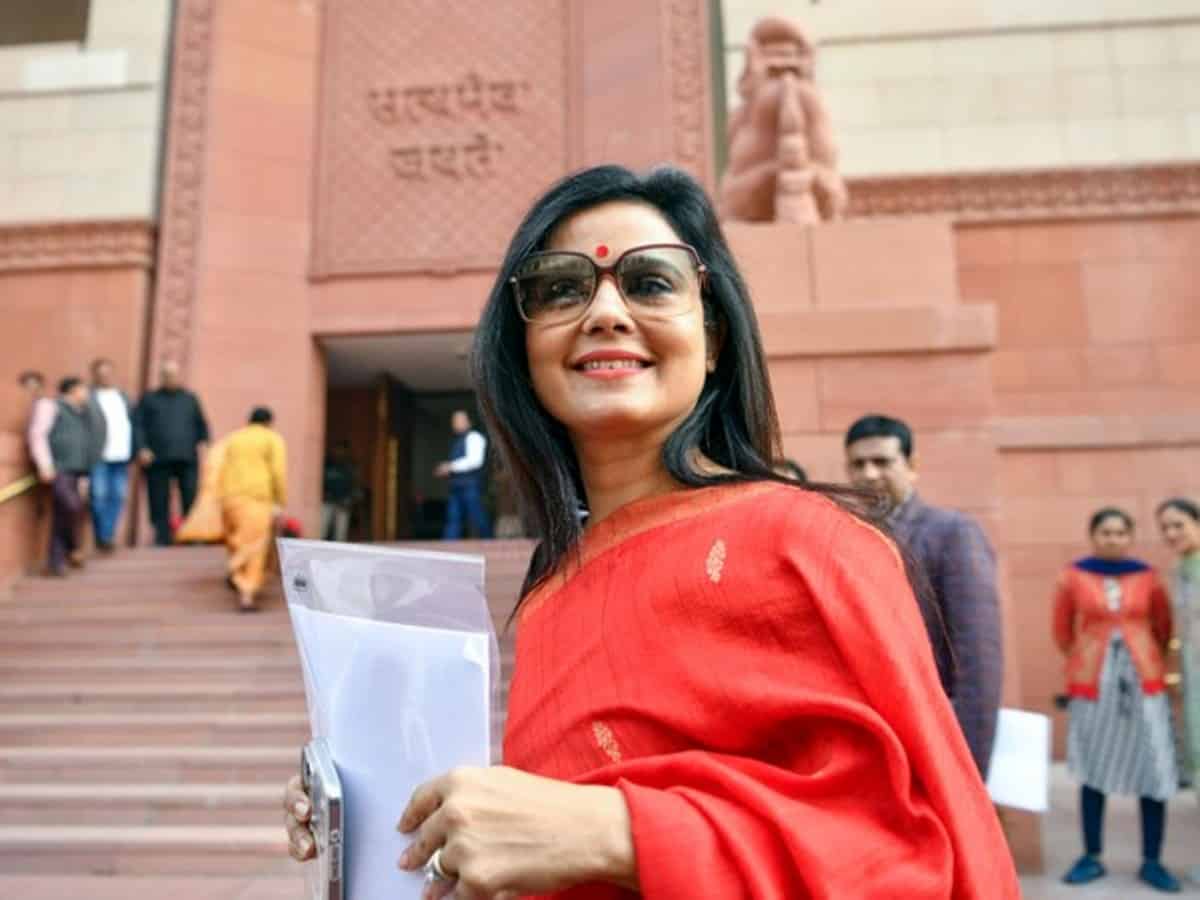

On February 14, Trinamool Congress member Mahua Moitra submitted her response to the CBI on the “cash-for-query” case alleged by BJP MP Nishikant Dubey on which she was expelled from the Parliament on 9th of December. The case emerged in October when Moitra was accused of sharing her login ID and password with the Parliament portal with the business magnate, Darshan Hiranandani, Moitra’s longtime friend who accused her of offering cash to him so that he could post questions directly onto the website, although later the allegation was changed to state that she had taken bribes for asking certain questions on behalf of Hiranandani.[1]
These allegations have emerged in light of Moitra’s fiery critique of the intimate relationship between the BJP Party and business mogul, Gautam Adani. Moitra later confirmed that she had in fact revealed the login details to Hiranandani so that someone in his office could ask some questions, but firmly denied the involvement of any bribes.[2] However, the Ethics Committee of the Lok Sabha recommended the expulsion of Moitra in November, which was upheld in Parliament in early December.
The other half story
However, this remains only half the story. Anyone who watched the events unfold would find it challenging, to say the least, to retell the story without describing the critical role played by the deep and rampant misogyny both in the parliamentary house and political landscape of India. From the very inception of this controversy, public discourse was engulfed in a systematic and meticulous character assassination of Moitra, dissecting which car she drove or investigating the price of the sarees she wears, which were perceived as “gifts” from someone, most likely Hiranandani. This attitude reached its zenith in November when the Ethics Committee bombarded Moitra with questions about her personal relations with Hiranandani, details about hotel rooms, and what his wife felt about their friendship. Moitra later described the hearing as a ‘vastraharan’ or public disrobing and said that the Ethics Committee, in front of the entire house, was insinuating that she was a ‘prostitute’.[3] What has ultimately surfaced is an anatomy of a patriarchal and archaic ideology that continues to persist in Indian politics.
Suspect of corruptibility
The question, of course, is why a woman MP, one of only 78 out of 534 in the Parliament, was seen as naturally suspect of corruptibility because of her wealth in a House where the average wealth of an MP is 1400 times that of an average Indian, and has been on a rise ever since the first National Democratic Alliance came to power in 2014, leaping from Rs. 5.06 crore to Rs 16 crore. Nearly 40 per cent of both Houses own assets worth at least Rs. 10 crore.[4] It was evident that our MPs are not, and never were, ‘average’, despite the rat race to appear as such. There was hardly anything scandalous about Moitra’s life to someone worth their salt, but much to anyone who deludes themselves that the etiquette of austerity in politics — the shadow of Gandhi — has any real value today. The witch-hunt that Moitra revealed, unsurprisingly, not only that the Indian public was not above the optical illusions of ‘simplicity’ performed by MPs — perhaps because the performance itself is seen as a virtue, even if no one can believe it to be true — but also betrayed a certain understanding of wealth and gender.
If the connotations have been correctly identified by Moitra and her party, and she was covertly being accused of extorting money from businessmen in return for sexual or romantic favours, the idea seems to be that women cannot possibly have wealth of their own. Even Moitra, who studied in Massachusetts and used to be an investment banker on Wall Street, somehow could not have had enough money to buy a few Louis Vuitton bags and had to be ‘gifted’ by a man. PM Narendra Modi himself leads an unsurreptitiously extravagant lifestyle, but when his suit sold for Rs 4.3 crore at an auction, it was widely seen as a sign of novelty.[5] While Nilanjan Mukhopadhyay, writing for The Wire, pointed out that her upper-caste background gives her no ‘struggle’ to justify her expensive choices as with PM Modi[6], it is also true that female Dalit MPs too are subject to the same treatment. Most notably, former UP Chief Minister Mayawati was hounded by the media for her ‘frivolous’ fixations on accessories, like her iconic pink handbag, in her day. The tirade against her was layered with heavy casteist outrage at the audacity of a BC woman daring to adorn herself.
The surveillance and policing of women in politics, especially those who do not adhere to a filial, virginal figure, — the shadow of Gandhi’s influence — is hardly unknown. This message is clear: the space for women who refuse to play the part of an asexual, virtuous mother figure is narrow and precarious. Curiously, the level to which the rumours of her ‘lavish’ lifestyle being ‘funded’ by Hiranandani — notably started by her former partner who stood as a ‘neutral witness’ in her hearing — was accepted even by those on the Left and Centre-Left was shocking.
Caught in corporate war
Whether it be the idea that she naively misjudged the ammunition she was giving to the opposition by wearing Louis Vuitton or was caught in the crossfire of a corporate war between Hirananda and the Adani group, the Left in India has shown their aversion to basic liberal principles and denied Moitra agency in both her personal and political choices. A common sentiment that was floating around on social media was that she had ‘slipped up’ and failed to comply with the unwritten rules of politics, with little acknowledgement of the fact that these ‘rules’ are steeped in a hegemonic dominance of politics by men and actively seek to exclude women.
Some issues emerged from this incident that were even more troubling, and it could be said what ultimately became of Moitra’s ‘trial’ was yet another case of ‘democratic backsliding’ — she was given all but 90 minutes to prepare her defence, was not allowed to cross-examine witnesses (one of whom was a ‘jilted lover’), and it is dubious whether the ethics committee has any jurisdiction to expel an MP. However, the misogynist crusade against Moitra indicates how the ruling party gathers consent for or legitimises their actions — by weaponising the public’s values — some justified, others archaic — against our own interests.
It, therefore, was disappointing to see that those on the centre and Left themselves failed to garner much sympathy for Mahua Moitra, even if her party and the INDI Alliance were compelled to come forward in support after she was forcibly removed from the premises of the Parliament. Trinamool Congress itself only voiced its solidarity after the expulsion. There remained many who seemed to have been adequately distracted by their embarrassment of Moitra for them to preface their rejection of the Ethics Committee’s decision with an admission of guilt.
My mates will desert me
Watching the spectacle unfold as a woman, it signalled to me that if I were to go into politics, my colleagues and comrades would not stand by me in the face of unbridled injustice if at all my personal life was not to their taste. Indeed, the ship seems to have sailed for most women already, given that even friendship with men is seen as suspect. Indeed, it was not just Moitra’s friendship with Hirananda that was being commented on, but her friendship with her colleague Shashi Tharoor. On the other hand, the ruling party unhesitatingly defends MPs accused of rampant sexual harassment and gives remission to the worst sex offenders in Indian history. It appears at times that our political culture has not stagnated, but regressed into a space where if one is in power, they are virtually above the law, and if one is not, then the ugliest legal and political weapons will be exploited against them.
Tanvi Rupakula graduated from Ashoka University, Hyderabad, last year with a Bachelor’s in History (Honors). She did her final year thesis under Prof. Mahesh Rangarajan on Princely Hyderabad and the context of Police Action.
[1] NOW, M. (2023). Mahua Moitra Expelled | Fiery Speech Outside Lok Sabha | Can Parliament Reverse Its Decision? [YouTube Video]. Retrieved from https://www.youtube.com/watch?v=flkPLXEP0qQ
[2] The Indian Express. (2023, December 8). Ethics panel report on Mahua Moitra tabled in Lok Sabha | What’s happened so far. Retrieved January 8, 2024, from The Indian Express website: https://indianexpress.com/article/india/mahua-moitra-ethics-panel-report-lok-sabha-9059342/
[3] Dhillon, A. (2023, November 13). Grit and glamour: how Mahua Moitra shook up the misogyny and hypocrisy of Indian politics. Retrieved January 8, 2024, from the Guardian website: https://www.theguardian.com/global-development/2023/nov/13/mahua-moitra-not-making-excuses-hypocrisy-in-indian-politics-and-her-terrible-taste-in-men
[4]Parvathi Benu. (2022, August 19). How rich are our MPs? Retrieved January 8, 2024, from BusinessLine website: https://www.thehindubusinessline.com/data-stories/data-focus/how-rich-are-our-mps/article65787227.ece
[5] Writer, S. (2016, August 22). PM Narendra Modi’s Rs4.31 crore suit enters Guinness Book record | Mint. Retrieved January 8, 2024, from mint website: https://www.livemint.com/Opinion/EgxmYlGFQFVcLBZTwp4QGP/PM-Narendra-Modis-Rs431-crore-suit-enters-Guinness-Book-re.html
[6] The Treatment of Mahua Moitra Is a Case Study on Gender, Power and Politics in India. (2018). Retrieved January 8, 2024, from The Wire website: https://thewire.in/politics/the-treatment-of-mahua-moitra-is-a-case-study-on-gender-power-and-politics-in-india



